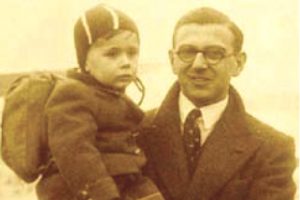Nicholas Winton, Hero
By Erin Naillon
War Looms
In 1938, the world was a year away from war. The Munich Agreement had resulted in the annexation of Sudetenland, an area of Czechoslovakia with a large ethnic German population. On November 9 and 10 of that year, the infamous Kristallnacht took place; synagogues, along with Jewish homes and businesses, were attacked by the Nazis. A total of 267 synagogues were completely destroyed in Austria, Germany, and Sudetenland.
29-year-old Nicholas Winton (born Nicholas Wertheimer to German parents in England) realized that war was imminent. His friend, Martin Blake, was associated with the British Committee for Refugees from Czechoslovakia. Blake invited Winton to join him in Czechoslovakia in December of 1938, and Winton readily agreed.
The Kindertransport
British-based Jewish agencies had already organized the Kindertransport, which eventually brought more than 10,000 Jewish children to safety in the United Kingdom. Winton based his rescue mission on this model, and began interviewing parents at his hotel in Prague’s Wenceslas Square; he was using the name of the British Committee for Refugees from Czechoslovakia, though, at the time, he had no authorization to do so. Winton was in charge of the Children’s Section, and as word spread, the lines grew.
Fundraising
Winton had to return to London to gain the necessary funds to bring the children to Britain. The government required a guarantee of fifty pounds for each child so that, eventually, the children would have the money to leave the United Kingdom. Winton also searched for families to care for the young refugees, whose parents would remain in Czechoslovakia. Winton put everything he had into his mission; after working at his day job, he spent hours raising money and finding homes for the children.
The Transports
On March 14, 1939, a planeload of children flew from Prague to London. Seven more transportations left by train, traveling through Germany to the coast, then sailing across the English Channel. On August 2, 1939, the last transport left Prague. Less than a month later, Germany invaded Poland, and the war officially started. Further transports were now impossible. 669 children, in all, were saved by Nicholas Winton.
Winton Honored
 For fifty years after the beginning of his rescue efforts, Winton’s deeds were largely unknown and unremembered by all but those directly involved. In 1988, his wife found a scrapbook with details of the transports, and the story became known to the public via a BBC television program (several of the audience members had been saved by him). He has been made an honorary citizen of Prague; in 1998, President Václav Havel presented him with the Order of T.G. Masaryk. The 1999 feature film All My Loved Ones takes a look at his rescue mission, as does the Slovak documentary film The Power of Good. In 2002, he was knighted by Queen Elizabeth II. He is the subject of a book titled Nicholas Winton and the Rescued Generation, co-written by Vera Gissing, who was saved by one of his transports. The Czech government has awarded him the Cross of Merit of the Minister of Defense, Grade I. The Czechs also nominated Sir Nicholas for the Nobel Peace Prize in 2008. Maidenhead Railway Station in Britain and Prague’s Hlavní nádraží (Main Station) both contain sculptures dedicated to Sir Nicholas.
For fifty years after the beginning of his rescue efforts, Winton’s deeds were largely unknown and unremembered by all but those directly involved. In 1988, his wife found a scrapbook with details of the transports, and the story became known to the public via a BBC television program (several of the audience members had been saved by him). He has been made an honorary citizen of Prague; in 1998, President Václav Havel presented him with the Order of T.G. Masaryk. The 1999 feature film All My Loved Ones takes a look at his rescue mission, as does the Slovak documentary film The Power of Good. In 2002, he was knighted by Queen Elizabeth II. He is the subject of a book titled Nicholas Winton and the Rescued Generation, co-written by Vera Gissing, who was saved by one of his transports. The Czech government has awarded him the Cross of Merit of the Minister of Defense, Grade I. The Czechs also nominated Sir Nicholas for the Nobel Peace Prize in 2008. Maidenhead Railway Station in Britain and Prague’s Hlavní nádraží (Main Station) both contain sculptures dedicated to Sir Nicholas.
Anniversary
On September 1, 2009, the “Winton train” left Prague’s Main Station, traveling the route that was taken by the original transport trains in 1939. Several of “Winton’s children”, as they call themselves, were passengers. This journey commemorated the last transport organized by Sir Nicholas, which never left Prague due to the start of World War II.
Sir Nicholas Winton celebrated his birthday on May 19, 2011. He is 102 years old.
Nicholas Winton Exhibition
The exhibition will be shown at Vyšehrad, free of charge, until the end of July 2011. It will then appear in cities throughout Germany, Israel, New York, and New Zealand. Read more about the exhibition here.



